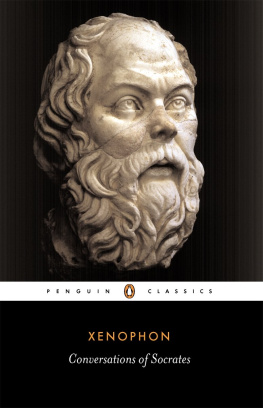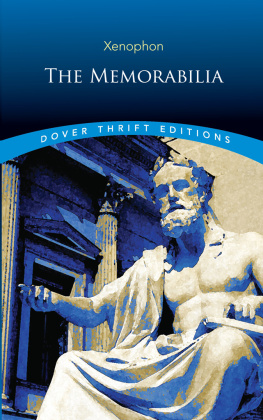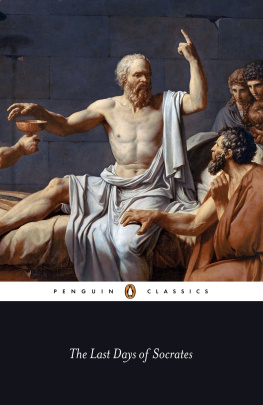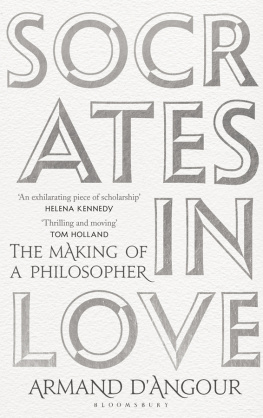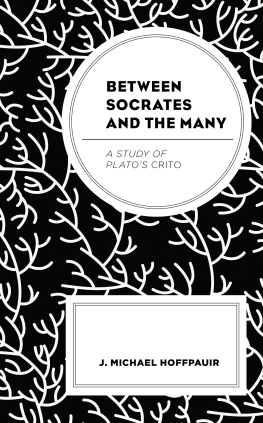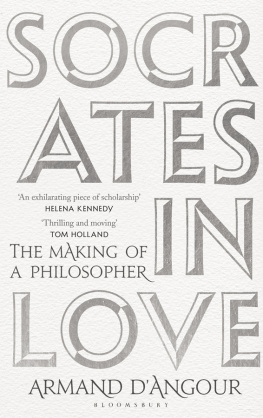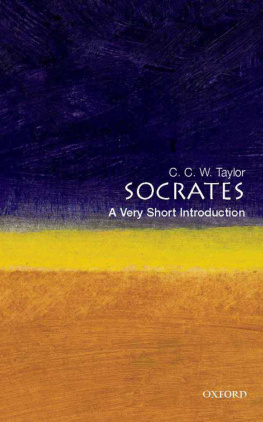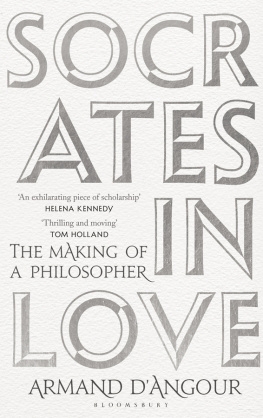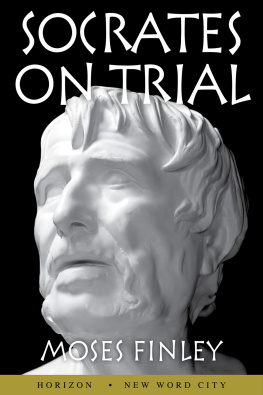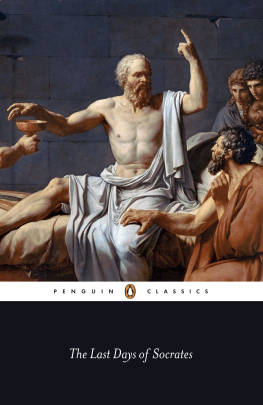Socrates. - Conversations of Socrates
Here you can read online Socrates. - Conversations of Socrates full text of the book (entire story) in english for free. Download pdf and epub, get meaning, cover and reviews about this ebook. City: London;Greece, year: 2004;2010, publisher: Penguin Group USA, Inc., genre: Science. Description of the work, (preface) as well as reviews are available. Best literature library LitArk.com created for fans of good reading and offers a wide selection of genres:
Romance novel
Science fiction
Adventure
Detective
Science
History
Home and family
Prose
Art
Politics
Computer
Non-fiction
Religion
Business
Children
Humor
Choose a favorite category and find really read worthwhile books. Enjoy immersion in the world of imagination, feel the emotions of the characters or learn something new for yourself, make an fascinating discovery.
- Book:Conversations of Socrates
- Author:
- Publisher:Penguin Group USA, Inc.
- Genre:
- Year:2004;2010
- City:London;Greece
- Rating:3 / 5
- Favourites:Add to favourites
- Your mark:
- 60
- 1
- 2
- 3
- 4
- 5
Conversations of Socrates: summary, description and annotation
We offer to read an annotation, description, summary or preface (depends on what the author of the book "Conversations of Socrates" wrote himself). If you haven't found the necessary information about the book — write in the comments, we will try to find it.
Socrates.: author's other books
Who wrote Conversations of Socrates? Find out the surname, the name of the author of the book and a list of all author's works by series.
Conversations of Socrates — read online for free the complete book (whole text) full work
Below is the text of the book, divided by pages. System saving the place of the last page read, allows you to conveniently read the book "Conversations of Socrates" online for free, without having to search again every time where you left off. Put a bookmark, and you can go to the page where you finished reading at any time.
Font size:
Interval:
Bookmark:

CONVERSATIONS OF SOCRATES
XENOPHON was an Athenian country gentleman born c. 430 BC. He may have helped to publish Thucydides History and certainly wrote his own Hellenica as a continuation of it. By his own (probably reliable) account he was a fine officer and outstanding leader, but his admiration for Sparta and devotion to Socrates led to his banishment. He was given an estate at Scillus and settled down to enjoy the life of a landed aristocrat under Spartan protection, and it was during this period that he began to write histories, biographies, memoirs and specialist treatises. Events forced him to move to Corinth in 371, but he was allowed to return to Athens in 365, where he lived until his death in c. 354.
HUGH TREDINNICK was born in 1899 and educated at King Edwards, Birmingham, and Trinity Hall, Cambridge, where he received a double first in Classics. He was Professor of Classics at Royal Holloway College from 1946 until 1966, and was also Dean of the Faculty of Arts at London University from 1956 to 1960. He was joint editor of the Classical Review from 1961 to 1967. He edited and translated works by Aristotle, as well as Xenophons Memoirs of Socrates and Platos The Last Days of Socrates for the Penguin Classics. Hugh Tredinnick died in 1982.
ROBIN WATERFIELD was born in 1952. He graduated from Manchester University in 1974 and went on to research ancient Greek philosophy at Kings College, Cambridge. He has been a university lecturer, and both copy editor and commissioning editor for Penguin. He is now a self-employed writer with publications ranging from academic articles to childrens fiction. He has translated various Greek philosophical texts, including several for Penguin Classics: Xenophons Hiero the Tyrant and Other Treatises, Plutarchs Essays, Platos Philebus and Theaetetus and (in Platos Early Socratic Dialogues) Hippias Major, Hippias Minor and Euthydemus. His biography of Kahlil Gibran, Prophet: The Life and Times of Kahlil Gibran, is published by Penguin. He has also edited The Voice of Kahlil Gibran for Penguin Arkana.
XENOPHON
OF
SOCRATES
Translated by Hugh Tredennick and Robin Waterfield,
and edited with new material by Robin Waterfield
PENGUIN BOOKS
PENGUIN BOOKS
Published by the Penguin Group
Penguin Books Ltd, 80 Strand, London WC2R 0RL, England
Penguin Putnam Inc., 375 Hudson Street, New York, New York 10014, USA
Penguin Books Australia Ltd, 250 Camberwell Road, Camberwell, Victoria 3124, Australia
Penguin Books Canada Ltd, 10 Alcorn Avenue, Toronto, Ontario, Canada M4V 3B2
Penguin Books India (P) Ltd, 11 Community Centre, Panchsheel Park, New Delhi 110 017, India
Penguin Books (NZ) Ltd, Cnr Rosedale and Airborne Roads, Albany, Auckland, New Zealand
Penguin Books (South Africa) (Pty) Ltd, 24 Sturdee Avenue, Rosebank 2196, South Africa
Penguin Books Ltd, Registered Offices: 80 Strand, London WC2R 0RL, England
www.penguin.com
Published in Penguin Classics 1990
18
This selection and introductions copyright Robin Waterfield, 1990
SOCRATES DEFENCE this translation copyright Robin Waterfield, 1990
MEMOIRS OF SOCRATES this translation copyright Hugh Tredennick, 1970
Revisions to this translation copyright Robin Waterfield, 1990
THE DINNER-PARTY this translation copyright Hugh Tredennick, 1970
Revisions to this translation copyright Robin Waterfield, 1990
THE ESTATE-MANAGER this translation copyright Robin Waterfield, 1990
All rights reserved
Except in the United States of America, this book is sold subject
to the condition that it shall not, by way of trade or otherwise, be lent,
re-sold, hired out, or otherwise circulated without the publishers
prior consent in any form of binding or cover other than that in
which it is published and without a similar condition including this
condition being imposed on the subsequent purchaser
To T. J. S.


The chief reason, and sufficient justification, for my wanting to translate Xenophons Socratic writings is that there is today a distinct danger of imbalance for English readers of ancient literature. To judge by what is available in bookshops, one would think that Plato was the only person who had ever written about Socrates. This is far from being the case: after Socrates death in 399 BC, a number of his followers, and some others, wrote dialogues with Socrates as the protagonist. As it happens, we have only the titles of most of these works and a few fragments of others. But we do possess the complete Socratic works not only of Plato, but also of Xenophon. Socrates was arguably one of the most important people in the history of mankind. In case we think that the portrait we find in Plato is the one and only Socrates the true Socrates it makes sense to have available Xenophons portrait as well. I say this without prejudging the question of which of these portraits is the more interesting or the more accurate; this is an issue to which I will return.
A less scholarly and more idiosyncratic reason for wanting to make Xenophons Socratic work available is somewhat as follows. It will soon become clear to the reader that Xenophons moral code is loosely describable as Victorian: at any rate, he is a staunch advocate of the quest for a healthy mind in a healthy body, to use Juvenals phrase. It seems to me that today, in the late 1980s, both the moral and political pendulum in a great many Western countries is swinging away from the flux of earlier years, and back to a desire for a secure way of life. The reader will find in the pages of Xenophon the modern worlds concerns for, among other things, physical fitness, healthy eating, self-restraint, self-responsibility and, of particular relevance given the threat of an AIDS epidemic, sensible sex. What is important in Xenophon, however, and why a new edition of his Socratic work seems to be timely, is not just the apparent contemporaneity of his thought, but the fact that his ideas are not based on unthinking acceptance of a conservative code or due simply to a swing of the pendulum in the collective unconscious; they are based on his own reflection on moral principles, which he derived from his acquaintance with Socrates. Whether or not this particular thesis is true, it is certain that reading Xenophons Socratic works can offer a different perspective on moral and political notions which are fast becoming idealized today.
This volume contains the complete Socratic works of Xenophon:appears to have used the first edition (1901) of E. C. Marchants Oxford Classical Text (Xenophontis Opera, vol. 2), although the better second edition (1921) should have been available to him: the second edition is a reprint of the first edition, but with emendations listed in an Addenda et Corrigenda section at the beginning of the book. I have taken the second edition of the Oxford Classical Text as my standard (though I have also consulted the relevant texts in the Loeb, Teubner and Bud series), and this too occasioned a number of changes to Tredennicks version. Where I prefer a different reading to that of Marchant, this has been mentioned in a footnote; this applies not only to the revisions of Tredennicks work, but also to my translations of
Font size:
Interval:
Bookmark:
Similar books «Conversations of Socrates»
Look at similar books to Conversations of Socrates. We have selected literature similar in name and meaning in the hope of providing readers with more options to find new, interesting, not yet read works.
Discussion, reviews of the book Conversations of Socrates and just readers' own opinions. Leave your comments, write what you think about the work, its meaning or the main characters. Specify what exactly you liked and what you didn't like, and why you think so.



